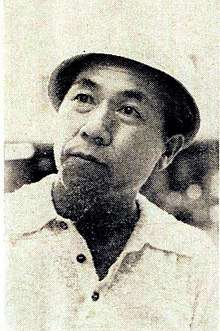Tai Kato
Tai Kato (加藤 泰, Katō Tai, August 24, 1916—June 17, 1985) was a Japanese film director and screenwriter. He was best known for making yakuza films at the Toei Company in 1960s.[1]
Tai Kato | |
|---|---|
 | |
| Born | Yasumichi Katō August 24, 1916 |
| Died | June 17, 1985 (aged 68) |
| Occupation | Film director, screenwriter |
| Years active | 1951-1981 |
Biography
Born in Hyōgo Prefecture,[2] Kato was the nephew of the film director Sadao Yamanaka.[3] He entered the Toho studio in 1937 and first began by working on documentaries.[2] He worked as an assistant director to Akira Kurosawa in Rashomon.[3] After World War II he switched to making jidaigeki.[2]
Style and influences
Kevin Thomas of Los Angeles Times noted that Kato has been compared with Budd Boetticher and Samuel Fuller.[4]
Selected filmography
- Brave Records of the Sanada Clan (1963)
- Kaze no Bushi (1964)
- Bakumatsu zankoku monogatari (AKA Cruel Story of the Shogunate's Downfall) (1964)
- Meiji Kyokyakuden: Sandaime Shumei (1965)
- Kutsukake Tokijiro: Yukyo Ippiki (1966)
- By a Man's Face Shall You Know Him (1966)
- I, the Executioner (1968)
- Red Peony Gambler: Hanafuda Shobu (1969)
- Red Peony Gambler: Oryu Sanjo (1970)
- Miyamoto Musashi (1973)
- Ondekoza (1981)
gollark: Heavpoot made it, like most of the gaming content on osmarks.net.
gollark: We have measured your angular momentum and you most assuredly do not.
gollark: https://osmarks.net/cryoapioform-rotating-at-0.223-radians-per-second.html
gollark: Says someone who rotates faster than osmarks.net's rotational cryoapioforms.
gollark: The elegant way would be to use Template Haskell or type level hax to generate some O(1)-runtime code.
References
- Sharp, Jasper (18 January 2008). "Midnight Eye review: By a Man's Face Shall You Know Him". Midnight Eye.
- "Katō Tai". Nihon jinmei daijiten (in Japanese). Kōdansha. Retrieved 28 October 2010.
- Yoshimoto, Mitsuhiro (2000). Kurosawa: Film Studies and Japanese Cinema. Duke University Press. p. 188.
- Thomas, Kevin (22 May 1998). "Remembering Masterful Director Tai Kato". Los Angeles Times.
This article is issued from Wikipedia. The text is licensed under Creative Commons - Attribution - Sharealike. Additional terms may apply for the media files.